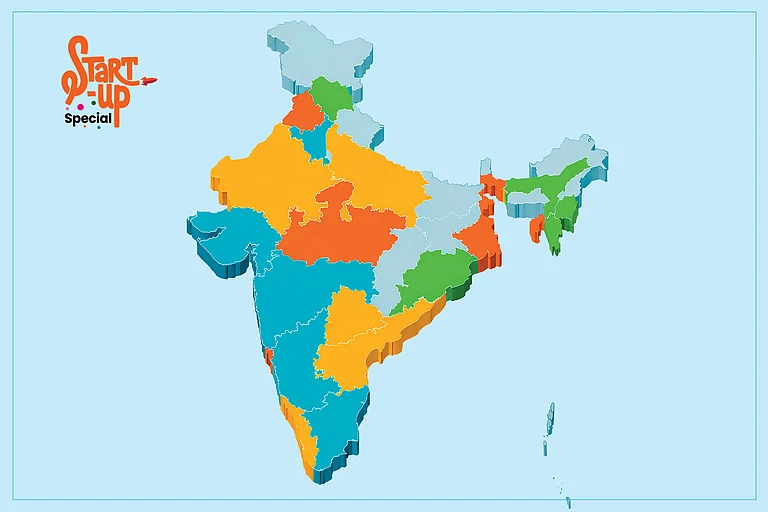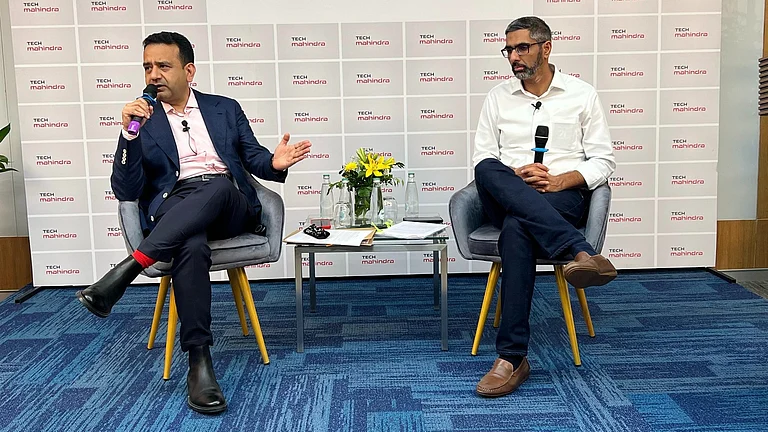As quintessentially Gujarati as dhokla, business in Gujarat is defined by the word dhandho, which stands for prudence and profitability. And so, while its canny entrepreneurs are taking belatedly to tech, they are shunning businesses that spell cash-burn. Instead, they are tucking happily into SaaS (software-as-a-service), which has for long been the monopoly of cities like Bengaluru, Pune, Chennai, and Hyderabad. Reason? The fast-scaling, subscription-based SaaS business is typically cash-light and versatile, much like the dhokla itself!
The results are evident: Since 2020, when it attracted $1.9 million in funding, Ahmedabad’s SaaS ecosystem has grown exponentially, raising $42.9 million this year—a 23-fold increase, as per data platform Tracxn. The cash rush has propelled well-known start-ups like Petpooja, Newsreach. Reelo, and ClinetJoy to new highs.
Experts pinpoint the acquisition of Ahmedabad-based software development services provider eInfochips by the NYSE-listed Arrow Electronics in 2018, as the turning point in the city’s SaaS revolution.
“The acquisition pitchforked Ahmedabad as a potential destination for building sizable businesses in this space,” says Amit Shingala, co-founder and CEO of Ahmedabad-based SaaS start-up Motadata.
From being focused on service-based companies, the city’s shrewd entrepreneurs soon caught on to the benefits of the real dhandho: building sustainable, subscription-based businesses with a steady ARR (Annual Recurring Revenue). Consequently, “SaaS became a key focus for many of these service-based companies, which started investing in R&D to explore new ideas for enterprises of all sizes— large, mid-market, SME,” says Shingala, whose software-based company offers solutions to manage IT operations.
Infibeam Ventures, a Gujarat-based, publicly-listed payments infrastructure company, exemplifies the transformation, shaped as much by the native Gujarati spirit of enterprise as by confidence.
Parthiv Patel, CEO and co-founder of PetPooja, which provides POS software to restaurants says, “As entrepreneurs started noticing success stories proliferate all around them, they began to believe that it is entirely possible to build a product company in the city. It did not matter whether it was B2C SaaS or B2B SaaS. What truly counted was the confidence of the builder for things to eventually fall into place and work out.”
What also worked in Ahmedabad’s favour was a fundamental shift in the stand of VC firms, which backed down from insisting that funders must necessarily move to Bangalore not just for tapping funds but also top-tier expertise. Prodded partly along by the pandemic, when emerging towns like Ahmedabad began to throw up start-up success stories, the funders realised that, hey, it is very possible to build start-up winners outside Bangalore too!
As Ankit Dudhwewala, CEO and founder of three SaaS companies—Appitsimple, SoftwareSuggest, and CallHippo—observes, “this shift enabled entrepreneurs build and scale from their home towns”.
The Dhandho Way: Prioritising Profitability
In Ahmedabad’s nascent tech ecosystem, profitability is a fetching catchphrase—reason why SaaS has raced up the charts. To a savvy Gujarati entrepreneur, SaaS is like an MVP in an IPL season – low on risks, high on rewards and perfectly aligned with the dhandho principles of profitability, prudence and patience. Popularised by investment guru Mohnish Pabrai, it emphasises the the virtues of leveraging opportunities with calculated risks, prioritising long-term gains over short-term wins.
Kapil Mathrani, co-founder of Ahmedabad-based consultancy firm Disruptium, which raised funds in 2021 and claims to have been profitable from day one says, “In Gujarat, the focus is on profitability rather than just revenue growth at all costs.”
While risks are endemic to the tech business, the SaaS model holds a distinct advantage as it is wound around robust cash flow management. Kamal Bansal, former Managing Director, Gujarat Venture Fund Limited (GVFL), who now runs his investment firm BRK Ventures, notes, "These companies have sufficient funds and control over cash plans, which allows them to sustain efforts like social media marketing. However, for consumer-focused brands, once social media marketing is paused, sales tend to drop sharply."
This fundamental differentiator of SaaS has significant implications for Ahmedabad’s start-up ecosystem. It allows the city’s entrepreneurs to play their natural game, focused on sustainable profits, and buck the trend of cash-burning consumer tech ventures, such as e-commerce and edtech, where profitability is tough to achieve and often beyond the horizon.
Dhruvil Sanghvi, CEO of the SaaS-based platform LogiNext, reveals, “In Ahmedabad it is not uncommon to meet tech entrepreneurs working with profit margins upwards of 10% and at times as high as 40%. Some of these companies churn up revenues running into hundreds of crores.” A New Jersey-based start-up founder, Sanghvi hails from Ahmedabad and is an avid follower of the Gujarat-based start-up ecosystem.
The single-minded pursuit of sustainable profits is essentially down to the background of these entrepreneurs. Patel of Petpooja says, "Many of the entrepreneurs have honed their skills in the crucible of family businesses that have flourished over generations by adhering to prudent dhandho practices across pricing, growth strategies, and operational burn."
Take, for example, Shingala of Motadata who credits his father for the success of his entrepreneurial journey. “I inherited invaluable playbooks on building businesses, recognising the right time to exit, evaluating risks, and continuing to move forward, simply by observing how my father ran his business,” he says.
As Ahmedabad’s start-up ecosystem evolves in its own typical dhandho style, one question lingers: What’s next? Some warn that artificial intelligence will disrupt the SaaS landscape. But experts believe that Ahmedabad’s SaaS companies are not likely to be blown by the change and are in fact already bracing for the challenge by leveraging AI to enhance their offerings. With funding expected to continue its exhilarating run of the last decade, start-ups will have the cash to invest big on AI and future-proof their ventures. Therefore, what would be really fascinating to watch is how the SaaS dhandho shapes up in the long-run, balancing profitability with innovation.
































